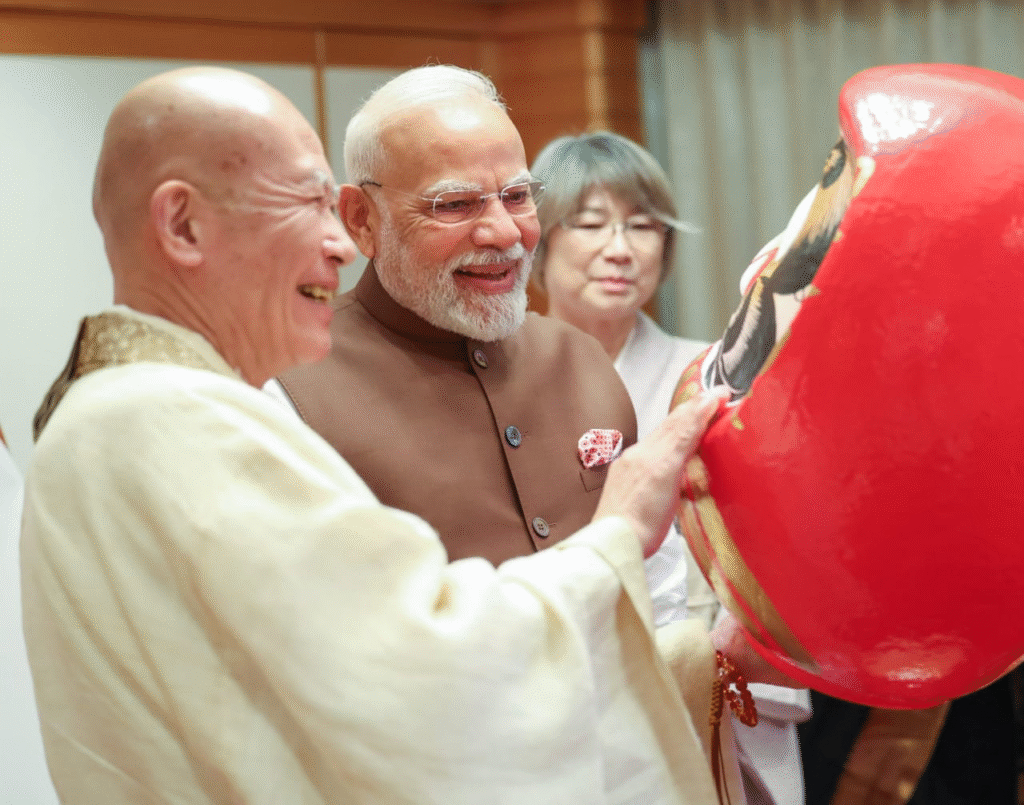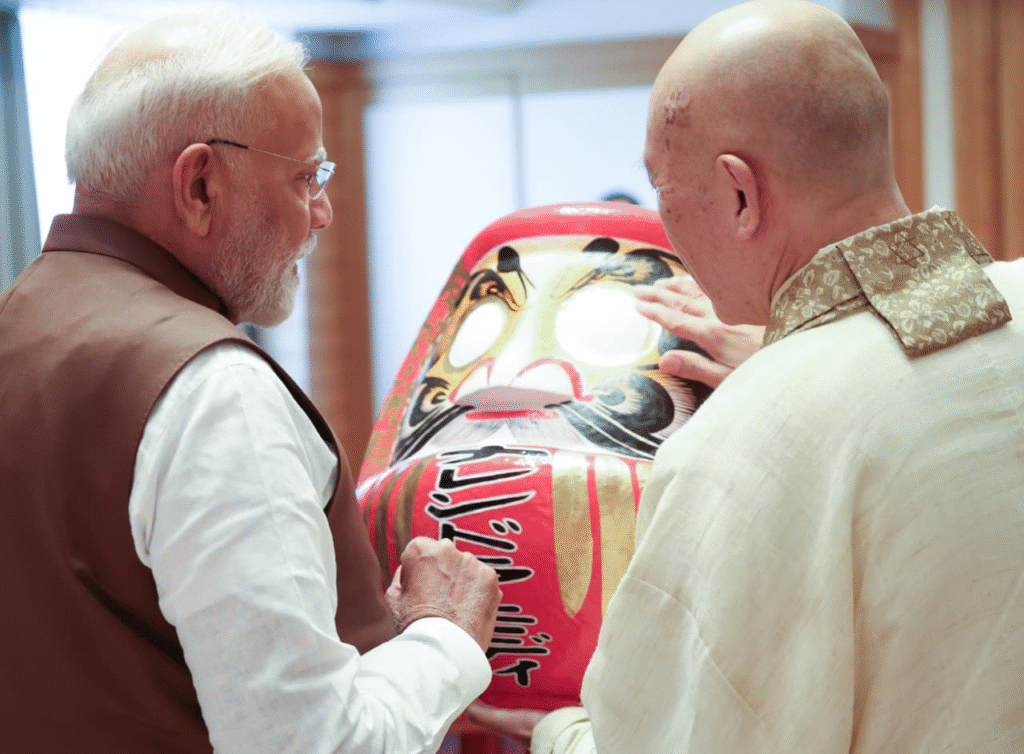Introduction
During his visit to Japan, Prime Minister Narendra Modi met Rev. Seishi Hirose, the Chief Priest of Shorinzan Daruma-Ji Temple in Takasaki, Gunma. On this occasion, PM Modi was presented with a Daruma Doll, a cultural symbol of Japan that carries deep meaning. The Prime Minister expressed his gratitude and highlighted how the Daruma Doll also has a connection with India through the legendary monk Bodhidharma.
This gesture was more than just a cultural gift. It symbolized friendship, respect, and the spiritual bond between India and Japan. In this article, we explore what a Daruma Doll is, why it is significant in Japan, its history, and why it was gifted to PM Modi.
Table of Contents
What is a Daruma Doll?
A Daruma Doll is a traditional Japanese talisman. It is usually made of paper-mâché, round in shape, and painted red. The doll represents perseverance, good luck, and resilience.
- The doll is modeled after Bodhidharma, a Buddhist monk believed to have traveled from India to China around the 5th–6th century CE.
- Bodhidharma is known for spreading Zen Buddhism and inspiring meditation practices.
- The design of the doll symbolizes never giving up. Because of its round shape, whenever it falls, it stands up again. This reflects the Japanese proverb: “Nanakorobi yaoki” which means “Fall down seven times, get up eight.”
Thus, the Daruma Doll is not just decoration. It is a symbol of determination and hope.

The Tradition of Using a Daruma Doll
In Japan, Daruma Dolls are often used during New Year celebrations, business beginnings, or personal goals.
- When someone sets a goal, they paint one eye of the Daruma Doll.
- Once the goal is achieved, they paint the other eye.
- This tradition keeps people motivated until they fulfill their wish.
For this reason, Daruma Dolls are also called “Goal Dolls” in Japan.
Why is the Daruma Doll Important in Japanese Culture?
The doll has been part of Japanese life for centuries. It is believed to bring prosperity, courage, and positive energy.
- It is a popular gift for new ventures, elections, or even during exams.
- Politicians in Japan often keep a Daruma Doll during campaigns, filling the second eye if they win.
- Families place it in homes to attract good fortune.
Thus, it represents the spirit of never giving up, which connects deeply with the Japanese mindset.
The Indian Connection – Bodhidharma
The Daruma Doll has a direct connection with India through Bodhidharma.
- Bodhidharma was an Indian monk from the southern region of India.
- He traveled to China and later influenced Japan through his teachings.
- He is regarded as the founder of Zen Buddhism and is also linked with the beginnings of Shaolin martial arts.
This shows how India’s spiritual heritage traveled across Asia and shaped cultures far beyond its borders. The Daruma Doll is, therefore, not just Japanese but also carries Indian roots.
Why Was It Gifted to PM Modi?
The gift of the Daruma Doll to PM Modi had multiple layers of meaning:
- Symbol of Respect – It was a gesture of honoring the Indian Prime Minister with one of Japan’s most treasured cultural items.
- India-Japan Friendship – By presenting something connected to both countries, it highlighted the shared history and spiritual ties.
- Message of Resilience – The doll represents determination and resilience, values that reflect India’s journey and leadership role in global affairs.
- Acknowledging Bodhidharma – Since the Daruma Doll is linked to an Indian monk, it was a way of showing how Indian culture still influences Japan.
Thus, the gift was not random. It carried deep symbolic value and reinforced cultural diplomacy.
PM Modi’s Response
PM Modi shared his gratitude on social media platform X (formerly Twitter). He wrote about meeting Rev. Seishi Hirose and expressed his appreciation for receiving the Daruma Doll. He also emphasized the India-Japan cultural connection and how Bodhidharma continues to inspire people across borders.
This message highlighted how cultural exchanges strengthen political and diplomatic ties.
India and Japan – A Strong Partnership
India and Japan have a long history of friendship. Both nations value Buddhist traditions, cultural heritage, and spiritual exchanges. Today, they are also close partners in technology, economy, defense, and global cooperation.
The Daruma Doll exchange is a reminder that while partnerships grow in modern areas like business and innovation, they also stand on a foundation of cultural respect.
ALSO READ : Modi in Bengaluru: A Historic Day of New Metro & Vande Bharat Launches

The Symbolism for the Future
For India, receiving the Daruma Doll is also symbolic. It reflects:
- Resilience of the nation in facing global challenges.
- Spiritual connection that binds Asia together.
- Hope and determination for stronger ties with Japan.
This simple yet powerful gift tells a story of cultural unity, patience, and shared values.
What is a Daruma Doll?
A Daruma Doll is a traditional Japanese talisman made of paper-mâché. It symbolizes perseverance, good luck, and resilience.
Why was PM Modi given a Daruma Doll in Japan?
PM Modi was gifted the Daruma Doll to honor him with Japan’s cultural symbol that also connects with India through Bodhidharma, the monk who inspired it.
How is a Daruma Doll used in Japan?
People paint one eye when setting a goal and the other eye after achieving it. This keeps them motivated and focused on success.
Conclusion
The Daruma Doll gifted to PM Modi is more than just a cultural artifact. It is a bridge between India and Japan, rooted in history and spirituality.
- It stands for perseverance, good luck, and never giving up.
- It honors Bodhidharma, an Indian monk whose teachings shaped Zen Buddhism.
- It represents the friendship between two nations that respect each other’s traditions.
For India, this moment is a reminder of its own spiritual legacy influencing the world. For Japan, it is a way of sharing its cherished culture with a trusted partner.
As PM Modi said, the Daruma Doll is not only a Japanese tradition but also a symbol that connects deeply with India. This gift reflects how cultural respect and shared values can strengthen diplomatic ties and inspire future generations.










